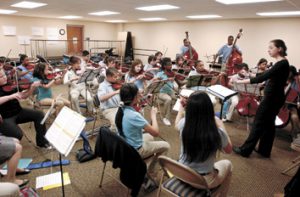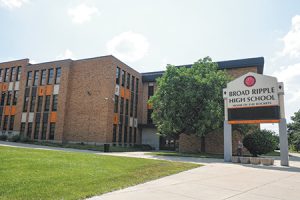For first time in 4 years, no struggling IPS schools face ‘innovation’ restart
It’s a departure for the district, which has handed six neighborhood schools to outside charter partners since the creation of innovation schools four years ago.
It’s a departure for the district, which has handed six neighborhood schools to outside charter partners since the creation of innovation schools four years ago.
Indianapolis Public Schools is giving raises to about 1,700 employees, less than three months after voters approved an increase in property taxes to boost school funding.
Fewer than half of Indianapolis Public Schools teachers are members of the Indianapolis Education Association, and some wonder if there is any point in paying dues to join a weakened union that seems to offer them very little.
In the first major look at the results for innovation schools in IPS—a new kind of district-charter partnership—there are some positive signs but still some unanswered questions.
Indiana graduation rates have held relatively steady since 2011, fluctuating by small amounts each year.

The new contract includes pay bumps ranging from 3 to 9 percent, with most eligible teachers’ salaries going up by at least $2,586 per year. But it also has provisions that teachers unions have typically opposed.
A month after voters approved a vast funding increase for Indianapolis Public Schools, the administration and the district teachers union have reached a tentative deal for a new contract that would boost teacher pay by an average of 6.3 percent.

Indianapolis Public Schools Superintendent Lewis Ferebee is a finalist for the open Washington, D.C., schools chief job, according to someone with knowledge of the search process.
Two outsiders who have been critical of the Indianapolis Public Schools board ended up defeating incumbents in last week’s election, a change that could prove pivotal for a district that has garnered a national reputation for its partnerships with charter schools.
One of the city’s largest charter operators could soon join Indianapolis Public Schools, in the latest sign that the line between charter and traditional public schools is becoming blurrier.
Less than two weeks before the election for Indianapolis Public Schools board, a little-known law could throw a wrench in the race for one candidate.
The political arm of Indiana’s largest teachers union is spending heavily on some of the candidates vying for seats on the board this November in the Indianapolis Public Schools board election.
The staff members and consultants would help the district implement some of the chambers’ broad recommendations for hundreds of millions of dollars in cuts in the coming years, including possible school closures, reduced transportation, and staff reductions.
With less than two months until Election Day, the effort to pass two referendums to increase funding for Indianapolis Public Schools is gaining momentum.
Last school year, Shortridge had fewer than 450 students. This fall, enrollment has swelled to more than 1,000, following the closure of three of Indianapolis Public Schools’ other high school campuses.

In a letter to Superintendent Lewis Ferebee and the IPS board, nine lawmakers urged the district to quickly accept a verbal offer to lease the building for up to $8 million.
The Richard M. Fairbanks Foundation announced Tuesday that it would give $7.5 million in grants to 24 Marion County schools and districts to help fund substance-use prevention.
Stand for Children Indiana will also launch a vast door-knocking campaign in support of two referendums requesting an extra $272 million from taxpayers, the group announced Thursday.
Superintendent Lewis Ferebee, who has made reducing the real estate owned by the district a cornerstone of his administration, mentioned the possibility of constructing new buildings during a media briefing this week.

The new proposal—which comes after a week of intense negotiations between the district and the chamber—passed 5-0 at a meeting Tuesday night.